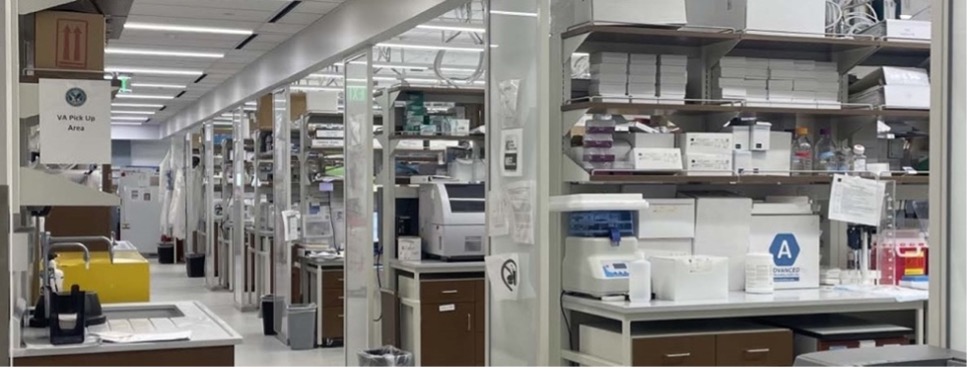
Center of Excellence for Neuroinflammation Research
The Center of Excellence for Neuroinflammation Research (CENIR) is dedicated to addressing the growing epidemic of complex neurovascular inflammatory disorders. These disorders, often overlooked and misdiagnosed, affect millions of people worldwide. CENIR is at the forefront of research and patient care, aiming to improve understanding, diagnosis, and treatment for these debilitating conditions.
Innovating Neuroimmune Disease Research
Our groundbreaking research is developing human neuroimmune brain-on-a-chip models using patient-specific stem cells. By simulating disease conditions, we aim to:
- Uncover disease mechanisms
- Identify novel biomarkers
- Discover promising therapeutic targets
Our advanced microfluidics and organ-on-chip technologies could revolutionize drug discovery and diagnostics, leading to early interventions and improved patient outcomes.
- A three-year research agreement for $1.5 million was awarded from Gateway Institute for Brain Research to Dr. Theoharides to create a human organoid brain-on-a-chip disease surrogate model for the study of Parkinsonism.
- Dr. Theoharides was again included in the University of Stanford/Elsevier 2024 top 2% of scientists worldwide.
- Reference: Ioannidis, John P.A. (2024), “August 2024 data-update for "Updated science-wide author databases of standardized citation indicators"”, Elsevier Data Repository, V7, doi: 10.17632/btchxktzyw.7
The Growing Epidemic of Neurovascular Inflammatory Disorders
Complex neurovascular inflammatory disorders affect more than 30% of the population and are characterized by inflammation orchestrated by mast cells, which regulate the permeability of the blood-brain barrier, activate microglia, and contribute to brain dysfunction. These conditions can impact multiple organ systems and often co-occur in the same individuals, leading to significant health challenges.
Patients frequently visit multiple specialists before receiving accurate diagnoses. Given that there is no effective treatment for these conditions, health providers prescribe on average two drugs or supplements per condition, with the risk of 25% adverse reactions for every two such treatments. Adverse drug reactions (ADRs) are estimated to account for up to 30% of all hospital admissions in the USA, and up to 40% of ADRs are estimated to be fatal among children.
- Allergies
- Amyotrophic Lateral Sclerosis (ALS)
- Alzheimer's Disease (AD)
- Atopic dermatitis
- Autism Spectrum Disorder (ASD)
- Chronic Urticaria
- Chronic Inflammatory Response Syndrome (CIRS)
- Dysautonomia syndrome
- Fibromyalgia syndrome
- Gulf War syndrome
- Interstitial Cystitis/Painful Bladder Syndrome (IC/PBS)
- Long COVID syndrome
- Mast Cell Activation Syndrome (MCAS)
- Multisystem Inflammatory Syndrome (MIS)
- Myalgic Encephalomyelitis/Chronic Fatigue Syndrome (ME/CFS)
- Parkinson's Disease (PD)
- Post-Lyme Syndrome (PLS)
- Toxic Mold Syndrome (TMS)
- Traumatic Brain Injury (TBI)
CENIR Objectives
- Identify why mast cells do not respond in many individuals and the molecules preventing them from release of allergic and inflammatory mediators
- Develop a unique diagnostic panel for mast cell activation disorders
- Develop unique diagnostic panels for neuroinflammatory disorders
- Develop human organoid brain-on-a-chip as disease surrogate
- Screen natural molecules and/or repurposed drugs as novel treatment options
- Design and execute pilot clinical studies
Our Team
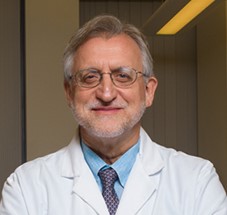 Theoharis C. Theoharides, M.S., M.Phil., Ph.D., M.D., FAAAAI
Theoharis C. Theoharides, M.S., M.Phil., Ph.D., M.D., FAAAAI
Director, Center of Excellence for Neuroinflammation Research (CENIR), Nova Southeastern University
Dr. Theoharides, is Professor and Vice Chair of Clinical Immunology and Director, Institute for Neuro-Immune Medicine-Clearwater, Nova Southeastern University, FL and Adjunct Professor of Immunology, at Tufts School of Medicine where he was Professor and Director of Molecular Immunopharmacology & Drug Discovery, and Clinical Pharmacologist, Massachusetts Drug Formulary Commission (1983-2022). He served on the Board of the Institute of Pharmaceutical Research and Technology (IFET) and the Supreme Health Council of the Ministry of Health in Greece. He received his BA, MS, MPhil, PhD and MD degrees and the Winternitz Price in Pathology from Yale University. He also received a Certificate in Global Leadership from Tufts Fletcher School of Law and Diplomacy and a Fellowship at Harvard Kennedy School of Government. He trained in Internal Medicine specialty at New England Medical Center which awarded him the Oliver Smith Award “recognizing excellence, compassion and service.” He received the Tufts Alumni Service Award, as well as the Tufts Distinguished Faculty Recognition and Excellence in Teaching awards multiple times. He has trained more than 200 hundred undergraduate, graduate, medical students and post-doctoral fellows. He has been studying the regulation of mast cells and microglia, as well as their role in neuroinflammatory diseases for over 30 years.
View Full Biography and List of Publications
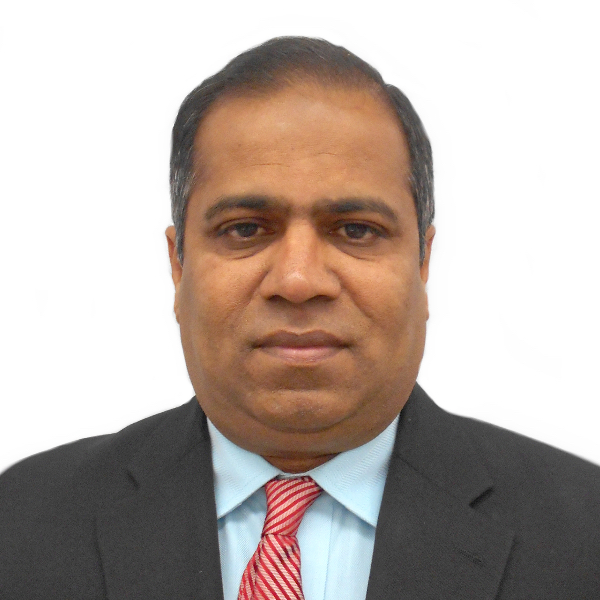
Kempuraj Duraisamy, M.S., M.Phil., Ph.D.
Associate Director, Center of Excellence for Neuroinflammation Research (CENIR), Nova Southeastern University
Dr. Kempuraj is an Associate Professor and Director of the Research Laboratory at the Institute for Neuroimmune Medicine, Dr. Kiran C. Patel College of Osteopathic Medicine, Nova Southeastern University. He earned his M.Phil. and Ph.D. degrees in Human Physiology/Neuroscience. He has been studying neuroinflammation and neurodegeneration and mast cells for over 25 years. He has expertise in neuroinflammatory and neurodegenerative disorders such as Alzheimer's disease (AD), Parkinson’s disease (PD), and traumatic brain injury (TBI), neurotherapeutics, and mast cell disorders and published over 175 research articles in scientific journals and presented over 250 Conference Abstracts in these research areas. His studies focused on the neurovascular unit/blood-brain barrier (NVU/BBB) disruption and damage, glial cell activation, endothelial cells and pericytes damage, neurodegeneration, neuroinflammatory markers, and neurotoxic mediators, cytokines, chemokines and growth factors in these diseases using human brain tissues from patients, animal models and in vitro brain cell culture models. He has trained many undergraduates, graduates, medical students, doctors, post-doctoral fellows, scientists, and junior faculties in neuroinflammation research for over 20 years.
View Full Biography and List of Publications
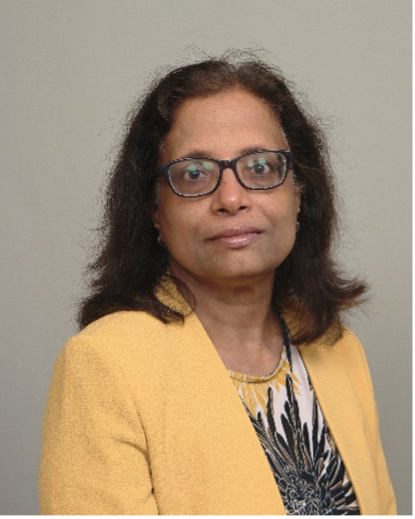
Geeta Ravindran, Ph.D.
Dr Ravindran is a Senior Research Scientist at the NSU Cell Therapy Institute and a Clinical Assistant Professor in the Department of Medical Education at the Dr Kiran C Patel College of Allopathic Medicine, NSU. She holds a PhD degree in Life Sciences from University of Mumbai and has more than twenty years of experience in stem cell research and translational neurobiology. Dr Ravindran has led numerous safety and efficacy studies for proof-of-concept testing in preclinical models of degenerative diseases. Her research focuses on the use of pluripotent stem cells for in-vitro disease modeling and therapeutic applications for neurodegenerative conditions including Parkinson's disease, Amyotrophic lateral sclerosis, Spinal cord injury, Traumatic Brain Injury. She has played a crucial role in initiating several technological advances that have contributed to the development and validation of proprietary methodologies / granted patents / publications that study the regenerative potential of both pluripotent and adult stem cells.
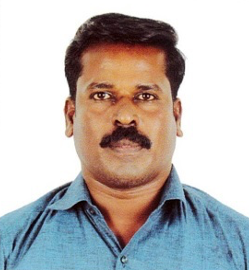
Baskaran Chinnappan, M.S., Ph.D.
Dr. Chinnappan is an Associate Research Scientist. He has expertise in mammalian cell culture and all forms of biomarker analysis required for the proposed experiments. He has six years of hands-on experience in oncology, with a strong background in cancer cell signaling and mitochondrial metabolism. His experience in computational approach to characterize the drug-protein interaction has helped me to publish several mechanisms in cancer drug-cell interactions. He has published about 28 research articles in peer-reviewed journals along with 4 book chapters that have a total citation of 364 with an h-index of 10. He will be involved in the culture of the iPSC-derived endothelial cells, mast cells, microglia cells and neurons, as well as in the stimulation experiments.
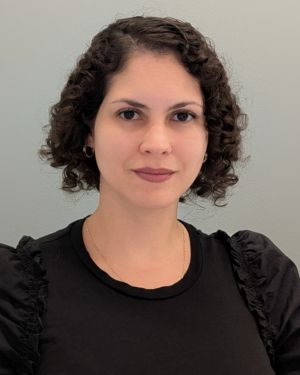
Claudia Pena, Ph.D.
Dr. Claudia Pena earned her Ph.D. in Cell and Molecular Biology from the University of Denver, where her research explored the mechanisms underlying neurodegenerative diseases such as Amyotrophic Lateral Sclerosis (ALS) and Parkinson’s disease (PD). Her work combined clinical and preclinical approaches, integrating both in vivo and in vitro models to investigate disease pathology and potential therapeutic interventions.
In vivo studies included evaluating the effects of different nutraceuticals on the lifespan, motor function, neuromuscular junction integrity, and neuroinflammation of the G93A mutant hSOD1 transgenic mouse model of ALS. She also contributed to a deep brain stimulation project in a rat model of PD, assisting in surgical electrode implantation in the motor cortex and Globus Pallidus, and neural activity recording. Additionally, Dr. Pena collaborated on preclinical traumatic brain injury (TBI) research, evaluating the cysteine-rich, glutathione precursor Immunocal® in mouse models of repetitive mild and mild-moderate TBI. This work demonstrated reduced gliosis and provided mechanistic insight into antioxidant-based neuroprotection following repeated head injury. In vitro studies used the BE(2)-M17 human neuroblastoma cell line, with the A53T mutation, as a model for PD, enabling the evaluation of neuroprotective compounds on cellular stress.
Furthermore, Dr. Pena has performed biomarker analyses of serum and cerebrospinal fluid specimens from ALS patients enrolled in a clinical trial. Implementing ELISA and SIMOA technologies, she assessed drug-target engagement, therapeutic efficacy, and impact on markers of neurodegeneration and inflammation. She further isolated exosomes from these patient samples to expand and deepen the scope of biomarker investigations.
Dr. Pena has contributed to peer-reviewed publications and presented her work at national and international conferences, including the Society for Neuroscience meeting, Keystone Symposia, and the International Brain Research Organization World Congress of Neuroscience.
At NSU, she applies her expertise to model neurodegenerative diseases using human induced pluripotent stem cell-derived dopaminergic neurons and brain organoids, with a focus on understanding neurovascular inflammation and its impact on neuronal function.
Select Publications
Kempuraj D, Dourvetakis KD, Cohen J, Valladares DS, Joshi RS, Kothuru SP, Anderson T, Chinnappan B, Cheema AK, Klimas NG and Theoharides TC. Neurovascular unit, neuroinflammation and neurodegeneration markers in brain disorders. Front. Cell. Neurosci. 18:1491952. 2024. doi: 10.3389/fncel.2024.1491952
Theoharides TC. Mast cell-sensory neuron interactions under stress. J Allergy Clin Immunol. 2024 Jul 25:S0091-6749(24)00680-8. PMID: 39066769.
Valeri J, Gisabella B, Garrett MR, Theoharides TC, Pantazopoulos H. Molecular profiling of the hippocampus of children with autism spectrum disorder. Mol Psychiatry. 2024 Feb 14. doi: 10.1038/s41380-024-02441-8.PMID: 38355786.
Cohen J, Mathew A, Dourvetakis KD, Sanchez-Guerrero E, Pangeni RP, Gurusamy N, Aenlle KK, Ravindran G, Twahir A, Isler D, Sosa-Garcia SR, Llizo A, Bested AC, Theoharides TC, Klimas NG, Kempuraj D. Recent research trends in neuroinflammatory and neurodegenerative disorders. Cells. 2024 Mar 14;13(6):511. PMID: 38534355.
Tsilioni I, Theoharides TC. Ochratoxin A stimulates release of IL-1β, IL-18 and CXCL8 from cultured human microglia. Toxicology. 2024 Feb; 502:153738. PMID: 38301823.
Theoharides TC, Twahir A, Kempuraj D. Mast cells in the autonomic nervous system and potential role in disorders with dysautonomia and neuroinflammation. Ann Allergy Asthma Immunol. 2024 Apr;132(4):440-454. PMID: 37951572.
Theoharides TC, Kempuraj D. Role of SARS-CoV-2 Spike-Protein-Induced activation of microglia and mast cells in the pathogenesis of Neuro-COVID. Cells. 2023 Feb 22;12(5):688. PMID: 36899824.
Kempuraj D, Aenlle KK, Cohen J, Mathew A, Isler D, Pangeni RP, Nathanson L, Theoharides TC, Klimas NG. COVID-19 and Long COVID: Disruption of the neurovascular unit, blood-brain barrier, and tight junctions. Neuroscientist. 2024 Aug;30(4):421-439. PMID: 37694571.
Kempuraj D, Selvakumar GP, Ahmed ME, Raikwar SP, Thangavel R, Khan A, Zaheer SA, Iyer SS, Burton C, James D, Zaheer A. COVID-19, Mast cells, cytokine storm, psychological stress, and neuroinflammation. Neuroscientist. 2020 Oct-Dec;26(5-6):402-414. PMID: 32684080.
Kempuraj D, Ahmed ME, Selvakumar GP, Thangavel R, Raikwar SP, Zaheer SA, Iyer SS, Burton C, James D, Zaheer A. Psychological stress-induced immune response and risk of Alzheimer's disease in veterans from Operation Enduring Freedom and Operation Iraqi Freedom. Clin Ther. 2020 Jun;42(6):974-982. PMID: 32184013.
Kempuraj D, Thangavel R, Kempuraj DD, Ahmed ME, Selvakumar GP, Raikwar SP, Zaheer SA, Iyer SS, Govindarajan R, Chandrasekaran PN, Zaheer A. Neuroprotective effects of flavone luteolin in neuroinflammation and neurotrauma. Biofactors. 2021 Mar;47(2):190-197. PMID: 33098588.
Theoharides TC, Perlman AI, Twahir A, Kempuraj D. Mast cell activation: beyond histamine and tryptase. Expert Rev Clin Immunol. 2023 Jun;19(6):639-654. PMID: 37029958.
Tziastoudi M, Cholevas C, Stefanidis I, Theoharides TC. Genetics of COVID-19 and myalgic encephalomyelitis/chronic fatigue syndrome: a systematic review. Ann Clin Transl Neurol. 2022 Nov;9(11):1838-1857. PMID: 36204816.
Tsilioni I, Natelson B, Theoharides TC. Exosome-associated mitochondrial DNA from patients with myalgic encephalomyelitis/chronic fatigue syndrome stimulates human microglia to release IL-1β. Eur J Neurosci. 2022 Nov;56(10):5784-5794. PMID: 36153118.
Get in Touch
Ft. Lauderdale-Davie
Center for Collaborative Research, 4th Floor
7595 SW 33rd Street
Fort Lauderdale, FL 33314
Directions
Kendall
Kendall Village Center
Professional Arts Bldg., Suite 111
8501 SW 124th Avenue
Miami, FL 33183
Directions
Phone:
(954) 262-2850
Hours:
Monday - Friday
9:00 a.m. - 5:00 p.m.
Connect with INIM on Social
For more information on becoming a donor or joining our newsletter, please email mcarr1@nova.edu.